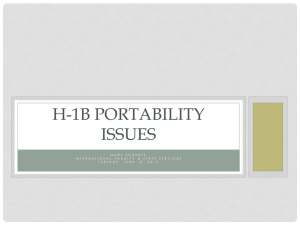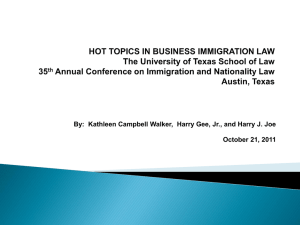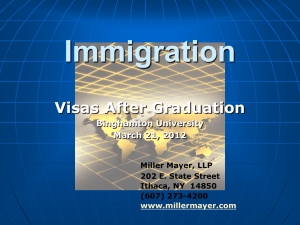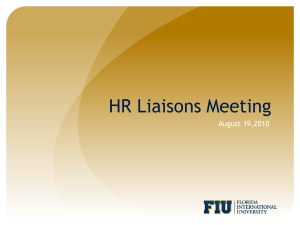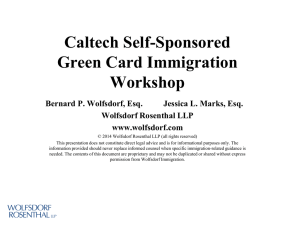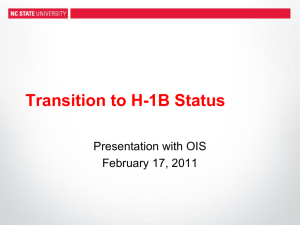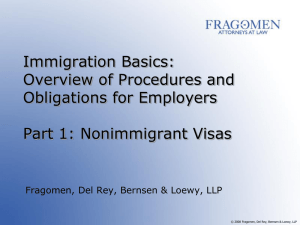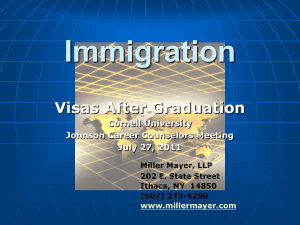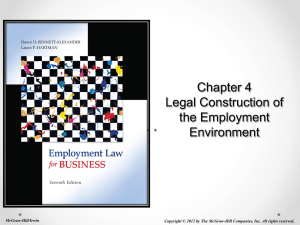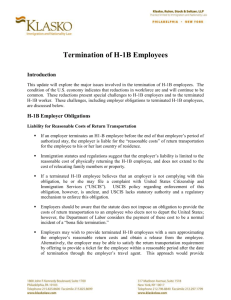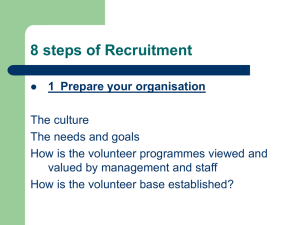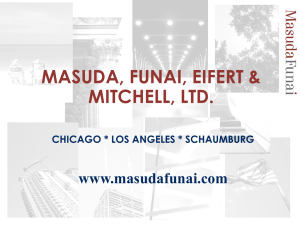Demystifying Immigration: - University of Alaska Anchorage
advertisement
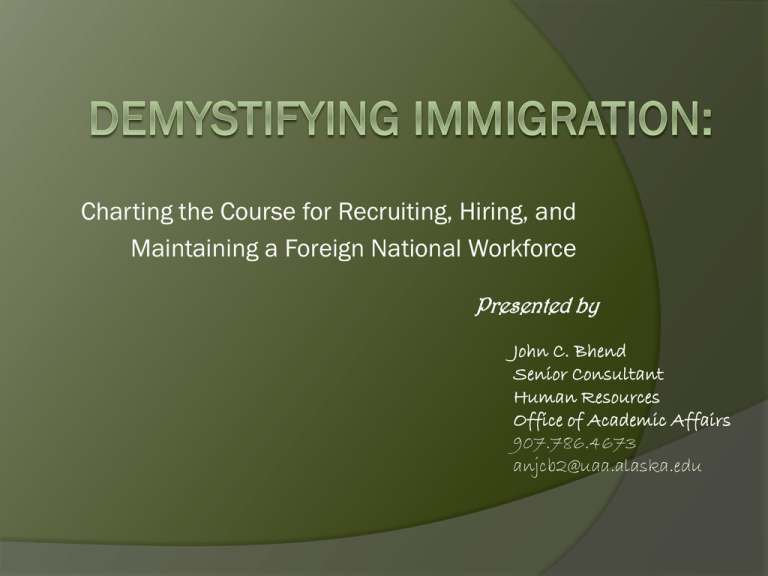
Charting the Course for Recruiting, Hiring, and Maintaining a Foreign National Workforce Presented by John C. Bhend Senior Consultant Human Resources Office of Academic Affairs 907.786.4673 anjcb2@uaa.alaska.edu Some Preliminary Vocabulary… Citizen Foreign National Immigrant = “Green Card” = Lawful Permanent Resident Nonimmigrant = Temporary/Finite Stay U.S. Department of Homeland Security (DHS) = U.S. Immigration & Customs Enforcement (USICE) U.S. Citizenship and Immigration Services (USCIS) U.S. Department of Labor (DOL) U.S. Department of State (DOS) Customs and Border Protection (CBP) Some Points to Consider during this Presentation… Visa = admission ticket (no guarantee of admission) I-94 card or a Employment Authorization Document (EAD) = defines period of stay and status in the United States during that stay “Knowing is half the battle” Recruiting Issues – Application and Interview What CAN I ask: Are you legally authorized for unrestricted employment in the United States? If the answer is “yes” the person is authorized to work in the US indefinitely and no further questions should be asked. If the applicant answers “no” to question one, the employer may ask the following: What visa status do you presently possess and will you require sponsorship for employment? Recruiting Issues – Application and Interview You Cannot Ask: – What kind of work authorization do you have? – How did you obtain citizenship/ green card? – What is your home country? – Do you have work authorization for an unlimited period? Does the Candidate Need Sponsorship? What Status Does the Candidate Have? – US Citizen or Lawful Permanent Resident – Employment Authorization Document (EAD) Might be limited, can it be renewed? Can start work – Non – Immigrant Work Visa Typically employer specific – Visitor Status Can not work – but can receive expenses and honorarium Need Work Status approved before starting Nonimmigrant Status Limited in Duration of Stay Limited in Activities Allowed Available for hiring the foreign scholar or faculty member, or administrator/nonfaculty position F-1 Optional Practical Training Optional Practical Training (“OPT”): Must be directly related to the major area of study; Student must obtain authorization from the International Students Office through SEVIS and then apply to the U.S. Citizenship and Immigration Services (“USCIS”) for an Employment Authorization Document (“EAD”) – student cannot begin employment until the EAD has been issued by the USCIS Must have completed one academic year of study OPT can be used during school year or after completion of the course of study: If during the school year, the student is limited to 20 hours per week of employment (40 hours per week during regular school vacations); If post-completion of full course of study, then OPT must be completed within 14 months following the completion of the course of study. Limited to 12 months of total OPT time whether used during, after or both (note – part-time OPT employment during the school year is deducted from the 12 months at only a ½ rate, i.e., 2 days of parttime would be deducted from the overall period as only 1 day of OPT). J-1 Exchange Visitor Employment Work-authorized categories for UAA include professors, research scholars, and short-term scholars. Professor: an individual primarily teaching, lecturing, observing, or consulting at post-secondary accredited educational institutions, museums, libraries, or similar types of institutions. A professor may also conduct research, unless disallowed by the sponsor. Research scholar: an individual primarily conducting research, observing, or consulting in connection with a research project at research institutions, corporate research facilities, museums, libraries, post-secondary accredited educational institutions, or similar types of institutions. The research scholar may also teach or lecture, unless disallowed by the sponsor Short term scholar: a professor, research scholar, specialist, or a person with similar education or accomplishments coming to the United States on a short-term visit for the purpose of lecturing, observing, consulting, training, or demonstrating special skills at the research institutions, museums, libraries, post-secondary accredited educational institutions, or similar types of institutions. Short-term scholars may also participate in collaborative research. J-1 Visitor cont. An individual may be selected for participation in the Exchange Visitor Program as a professor or research scholar subject to the following conditions: The participant shall not be a candidate for tenure track position; and The participant has not been physically present in the United States as a nonimmigrant pursuant to the provisions of 8 U.S.C. 1101(a)(15)(J) (in J status) for all or part of the twelve month period immediately preceding the date of program commencement set forth on his or her Form DS-2019, unless: J-1 Visitor cont. (A) The participant is transferring to the sponsor's program as provided in Sec. 514.42; or (B) The participant's presence in the United States was of less than six months duration; or (C) The participant's presence in the United States was pursuant to a Short-term scholar exchange activity as authorized by Sec. 514.21. Prior to reapplying for entry into the United States, J-1 scholars are often required by law to return to their home country for two years to use the skills and knowledge they have gained. H-1B Classification – the Immigration “Staple” for Faculty “Specialty Occupation” = Professional Position must require a bachelor’s degree in specific specialty Foreign national must possess minimum credentials to perform services in specialty, i.e., must have minimum bachelor’s degree or equivalent (foreign degree, experience or combination) The H-1B Process Once university or college’s offer is accepted by a qualified foreign national: Labor condition application (LCA) is prepared LCA is filed with the DOL and posted on worksite Upon receipt of certified LCA, the H-1B petition and supporting documentation is filed with USCIS Premium Processing Program $1,000 – guarantees” 15 day processing time Non-Premium = 4-6 months processing time H-1B University Policy The recruitment will be open for no shorter than 30 days. All postings will be in UAKjobs as an external recruitment 30 days internet advertisement (highedjobs.com) For all faculty positions, print advertisement should be in one national publication or journal applicable to the professional position. It should also refer applicants to submit their resume through the UAKjobs website. The most common publication for faculty members is Chronicle of Higher Education. The department will cover all costs (attorney fees, application fee, fraud fee, and expedited processing fee). H-1B Basics H-1B status is employer and job-specific H-1B status valid for initial 3-year period and may be extended for additional 3 years Honoraria for Professors/Scholars: Giving speeches, lectures, etc. in locations other than the employer’s location is not prohibited for an H-1B employee in academia, and is quite frequent. However the H-1B worker must not be paid or derive a material gain, except for transportation and reasonable living expenses and is limited in the number he/she is allowed to obtain. H-1B LCA Requirements Employer must maintain a Public Inspection File LCA and Cover Page Actual Wage Memo Prevailing Wage Information Summary of Benefits provided Employer must retain LCA documents for one year beyond last date any: H-1Bs employed under LCA Date LCA expires Date LCA withdrawn H-1B Labor Condition Application (LCA) Requirements Goal of the LCA is to protect all workers Must be posted at the place of employment or the principal place of business Employer must attest to four basic items: Pay the prevailing wage (note: separate university scale) Provide similar working conditions No strike or lockout Notice has been provided H-1B Portability: Hiring a Foreign National already in H-1B status H-1B worker may begin employment with new employer as soon as the H-1B petition is filed. O-1 Extraordinary Ability Intended only for the top few in the field of expertise in the world Must have: Major award or prize (Nobel, Fields, etc.); OR Documentation from 3 of 8 categories specified in the Regulations; OR Other “comparable evidence” The job need not require extraordinary ability Initial O-1 period is 3 years, annual extensions indefinitely thereafter in one year increments (foreign national must continue to demonstrate extraordinary ability and achievements) TN Classification Available only to Mexican and Canadian Nationals Specific list of occupations in NAFTA One year initial admission – extensions can be granted in one-year increments Biggest obstacles: Demonstrating non-immigrant intent and “fitting” within defined occupations Processing: For Canadians: Can apply directly at Class A POE/PFI For Mexicans: Can apply directly at the US Embassy E-3 Classification No USCIS petition required; apply for visa directly with Consulate but limited to Australian citizens All visa issuing US consulates in Australia accept applications If in the US in an eligible status, can apply to change status to E-3 through the USCIS Admitted for two years No maximum stay for E-3s Limited to 10,500 per year Spouse can get authorization to work E-3 Requirements Job offer from US employer (E-3 support letter) Must be filling a position in the US that requires attainment of a bachelor’s degree Must have foreign equivalent of a US bachelor’s degree related to field of work (experience equivalency allowed) Certified Labor Condition Application (LCA) All other normal visa application documents Evidence that stay in US will be temporary I-9 Requirements Basic I-9 Requirements MUST complete for every new hire after November 8, 1986 Hire = actual commencement of employment May not knowingly hire or continue to employ a person who is not authorized to work in the U.S. “Knowingly” = actual or constructive knowledge Employee = individual who provides services or labor for wages or other remuneration (charitable distinction) Preparing the I-9 Section 1 – Employee Information Section 2 – Employee Documents Section 3 – Re-verification By When Must the I-9 Be Completed? Section 1 is to be completed by the employee at the time employment begins (Day 1). Section 2 must be completed by the employer by the 3rd day of employment. (By the 1st day of employment if the individual will work 3 or fewer days.) Section 3 must be completed by the expiration date of the foreign national’s work permission. Practical Hints — Section 1 Employee Authorization Verification v. NonDiscrimination Do Not Ask For Any Documents To Substantiate Section 1 Do Not Ask For Any Particular Documents For Section 2 (from list A or B and C) Review Documents Produced For Section 2 Against Section 1 And Give Employee A Chance To Correct Section 1 Practical Hints — Section 2 Accept Any Document Specified in List A, List B or List C, Provided That It Appears To Be Genuine And To Relate To The Employee Make Sure Documents Proffered Are On List A, List B or List C Do Not Ask Employee To Complete Form I9 Prior To Offer of Employment Do Not Consider Work Authorization Date In Making Hiring Decision Practical Hints — Section 2 Do Not Ask For INS/USCIS Document Confirming Expiry Date of Work Authorization Instructions Suggest Document Filing Receipts = 90 Day Grace Period --- Be Careful USCIS Position Has Changed I-9 Penalties Paperwork violations $110 to $1,100 per I-9 for errors or omissions Knowing employment of unauthorized workers: First: $275 -$2,200 Second: $2,200 - $5,500 Third: $3,300 - $11,000 Pattern or practice: $3,300 per and/or imprisoned for up to six months in addition to civil penalties Basic I-9 Issues/Violations Citizenship status discrimination National origin discrimination Document abuse May not ask for more or different documents May not specify which documents are acceptable May not refuse to accept valid documents Retaliation IMMIGRANT VISAS Available for hiring the foreign scholar, faculty member, and essential professional staff for a permanent basis University of Alaska policy; only for tenure track faculty and IT staff Permanent Residency Can stay in the US for as long as one wants Can work for anyone Not US citizens – Cannot vote; could lose status for extended absence from US or committing certain offences “Green Cards” through Employment First Preference (EB-1) Extraordinary Ability, Outstanding Researchers and Professors, and Managerial or Executive Transferees No Labor Certification requirement Second Preference (EB-2) Exceptional ability, National Interest Waiver (NIW), and advanced degree professionals No Labor Certification for NIW & Exceptional ability Third Preference (EB-3) Professional, skilled, and unskilled workers Why do the Preference categories matter? First Preference: Extraordinary Ability Extraordinary Ability Foreign Nationals: Similar to O-1 nonimmigrant classification Must have: Major award or prize (Nobel, Fields, etc.); OR Documentation from 3 of 10 categories specified in the Regulations; OR Other “comparable evidence” Documentation extensive/Scrutiny High Outstanding Researchers and Professors Must demonstrate 3 years teaching or research experience in academic area Must have permanent job offer in a tenured or tenure-track position or for a term of indefinite duration Must demonstrate at least 2 of 6 categories Second Preference: National Interest Waiver Waiver of Job-Offer Requirement (no labor certification) “National Interest” Test: Foreign national will work in area of “substantial intrinsic merit” Foreign national’s proposed activity “national in scope” “Foreign national will serve the national interest to a substantially greater degree than an available U.S. worker having the same minimum qualifications” Schedule A, Group II Labor Certification Exemption Exceptional ability in the sciences or art including university professors: Widespread acclaim and international recognition in the field Foreign national has exceptional ability and job requires exceptional ability 2 of 7 Regulatory criteria Filing of Labor Certification documents directly with the USCIS Exceptional Ability & Advanced Degree Professionals Foreign Nationals of “Exceptional Ability” in the Sciences, Arts or Business Individual will substantially benefit the U.S. economy, cultural, or educational interests Requires the filing of a labor certification with USCIS and 3 of 6 Regulatory criteria Advanced degree professionals Must hold a master degree, its equivalent or higher (or bachelor’s + 5 years experience) Must obtain a labor certification Third Preference: Require a Labor Certification Labor Certification is designed to test the U.S. labor market to ensure that no minimally qualified U.S. workers are ready, willing, and able to fill the position The Labor Certification is employer, position, and geographic specific Minimum Requirements = minimum education, training, experience, and special requirements needed to adequately complete the core duties of the position Recruitment Timing of Recruitment Must be less than 180 days old at time of filing. Recruitment does not have to cover entire 180 day period. Must have 30 day “Quiet” period before filing. Be careful as mistake in counting days will cause a denial. Staff Recruitment Required Recruitment 30 day Job Order with the State Workforce Agency 2 Sunday Newspaper Ads or 1 Professional Journal Consecutive Sundays Notice of Job Availability (Paper Posting at worksite) Minimum of ten consecutive business days. Be aware of legal holidays, weekends don’t count even if business is open. Staff Recruitment cont. Alternative Forms – Must have 3 out of 10 Job fairs Job search web site (higheredjobs.com) Employer’s web site (UAKjobs) On-campus recruiting Trade or professional organizations Private employment firms Employee referral program, if it includes identifiable incentives A notice of the job opening at a campus placement office, if the job requires a degree but no experience Local and ethnic newspapers Radio and television advertisements Staff Recruitment cont. Prevailing Wage Must obtain prevailing wage from state where job will be located. Prevailing Wage must be valid during recruitment period. Prevailing Wage does not have to be “valid” when you file. Offered wage must meet prevailing wage or higher. Faculty Recruitment For faculty and research positions at UAA The recruitment will be open for no shorter than 30 days. Set up the job in UAKjobs as an external recruitment 30 days internet advertisement (highedjobs.com) For all faculty positions, print advertisement should be in one national publication or journal applicable to the professional position. It should refer applicants to submit their resume through the UAKjobs website. The most common publication for faculty members is Chronicle of Higher Education Faculty Recruitment cont. The department must post the position in the employee’s work place for 10 full business days, in the same location as other government mandated postings. The department must note on the posting the date it was posted and the date it was taken down. Special Handling Labor Certifications Limited labor certification process Available only for foreign national college and university teachers Must show that no equally qualified U.S. worker available (note: normal labor certification – must show that no minimally qualified U.S. worker is available) The employer may recruit for university faculty under the basic PERM labor certification process or elect to have the case handled as a special handling matter Must be filed within 18 months of competitive recruitment process What triggers an audit? Foreign language requirement. Experience requirement that exceeds the Specific Vocational Preparation (SVP) code for the position. Unduly restrictive requirements. Failure to check the appropriate boxes. “Green Card” Practice Pointers Must initiate the “green card” process (e.g., labor certification) at least one-year prior to the end of the foreign national’s six-year maximum stay in H-1B status to be eligible for additional stay in H-1B status. It is preferable for the “green card” process to be initiated within the first 18 months from the date of hire. If a college or university is considering the foreign national candidate for a tenure-track employment, then the “green card” must be part of that conversation and must be considered in the maintenance of employment process Caveat: once a foreign national has the “green card,” then he or she is eligible for “open-market” employment Thank You
